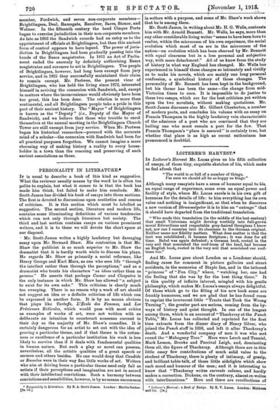PERSONALITY IN LITERATURE.*
IT is usual to describe a book of this kind as suggestive. What the reviewer usually means by the word be is often too polite to explain, but what it comes to is that the book has made him think, but failed to make him conclude. Mr. Scott-James has divided his book of essays into three sections. The first is devoted to discussions upon aesthetics and canons of criticism. It is this section which must be labelled as suggestive. The second section, literature and modern life, contains some illuminating definitions of various tendencies which run not only through literature but society. The third and last section contains essays on various prominent writers, and it is to these we will devote the short space at our disposal.
Mr. Scott-James writes a highly laudatory but damaging essay upon Mr. Bernard Shaw. His contention is that Mr. Shaw the publicist is so much superior to Mr. Shaw the dramatist that it is hardly worth while to discuss his plays. He regards Mr. Shaw as primarily a social reformer, like Henry George and Karl Marx, as one who sees life "through the intellect rather than through the perceptions," and as a dramatist who treats his characters "as ideas rather than as persons." He asserts that perhaps Caesar and Cleopatra is the only instance in which Mr. Shaw has allowed "a subject to exist for its own sake." This criticism is clearly much too sweeping. There is no reason why a work of art should not suggest an idea or a definite criticism of life which can be expressed in another form. It is by no means obvious that plays like Tartuffe, L'Ecole des Femmes, and Les Pricieuses Ridicules, which would pass with most critics as examples of works of art, were not written with as deliberate an intention to counteract nonsense current in their day as the majority of Mr. Shaw's comedies. It is certainly dangerous for an artist to set out with the idea of proving a particular theme, and if that theme is the rotten- ness or excellence of a particular institution his work is less likely to survive than if it deals with fundamental qualities in human nature. But such a play or novel can possess, nevertheless, all the artistic qualities of a great speech or sermon and others besides. No one would deny that Candide or Rasselas were in their way fine little works of art.- Writers who aim at driving home a particular theme need only fail as artists if their perceptions and imagination are not in accord with their intellectual convictions. Such a harmony between convictions and sensibilities, however, is by no means uncommon
• Personality in Literature. By R. A. Scott-James. London Diartin Seeker. Us. bd.]
in writers with a purpose, and some of Mr. Shaw's work shows that be is among them.
Mr. Scott-James, in writing about Mr. H. G. Wells, contrasts him with Mr. Arnold Bennett. Mr. Wells, he says, more than any other considerable living writer "seems to have been born to realize, within the microcosm of his own experience, the social evolution which most of us see in the microcosm of the nation—an evolution which has been observed by Mr. Bennett with equal clearness but in a less personal and subjective way, with more detachment." All of us know from the study of history in what way England has changed. Mr. Wells has experienced in himself these changes so intimately and vividly as to make his novels, which are mainly one long personal confession, a symbolical history of those changes. The personality of Mr. Bennett has been kept in the background, but his theme has been the same—the change from mid- Victorian times to ours. It is impossible to do justice to these two essays, which are far the best criticism yet written upon the two novelists, without making quotations. Mr. Scott-James discusses also Mr. Gilbert Chesterton, a number of modern poets, and concludes his volume with an essay on Francis Thompson in the highly laudatory vein characteristic of the admirers of a poet who are convinced that they are bailing one who must remain a poet for the few. That Francis Thompson's "place is assured" is certainly true, but whether that place is as high as recent enthusiasm has pronounced is doubKal.






























































 Previous page
Previous page